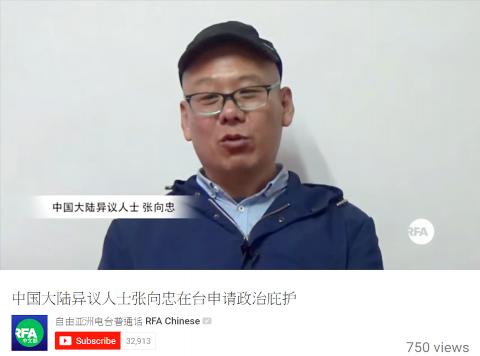Chinese dissident Zhang Xiangzhong (張向忠) on Friday said that he would seek political asylum in Taiwan.
Zhang was part of a tour group on an eight-day tour of Taiwan that arrived on Wednesday.
The Tourism Bureau yesterday said that it was told by the travel agency hosting the group that on Thursday Zhang left the hotel it booked for them and his whereabouts were unknown.

Photo taken from a video on Radio Free Asia’s YouTube channel
Zhang, 48, from Shandong Province, said in an interview with Radio Free Asia that he was jailed for three years after taking part in the “New Citizens’ Movement,” a group that calls for civic spirit based on freedom, justice and love.
Since being released in July last year, he has been under constant surveillance, Zhang said.
Zhang said he was inspired by Lee Ching-yu (李凈瑜), the wife of Taiwanese rights advocate Lee Ming-che (李明哲), when considering leaving the tour group and is to ask the government for political asylum.
Lee Ming-che, a former Democratic Progressive Party worker who is a staff member at Wenshan Community College in Taipei and a volunteer at non-governmental organization Covenants Watch, was detained in China after entering the city of Zhuhai from Macau on March 19.
Lee Ching-yu issued a public letter after the Chinese government annulled her “Taiwan Compatriot Travel Document” on Monday that prevented her from visiting China to search for her husband.
Zhang said he has been moved by Lee Ching-yu’s indomitable spirit and unwillingness to bow to Beijing.
Zhang later yesterday was quoted by the Central News Agency as saying that he has yet to receive word from the government, adding that he plans to visit the Mainland Affairs Council on Tuesday to seek political asylum.
Zhang said he has acquaintances in Taiwan to assist with arranging temporary living quarters and other affairs.
Meanwhile, the council yesterday said that Zhang’s whereabouts were not known, while the National Police Administration and the National Immigration Administration have been informed of Zhang’s actions.
The Tourism Bureau said that it has asked the travel agency to search for Zhang.
Travel agencies — which act as guarantors for visitors using their services — could face a fine of NT$100,000 if a Chinese tourist stays beyond their allotted time.
The Regulations Governing the Approval of People of the Mainland Area Visiting Taiwan for Purposes of Tourism (大陸地區人民來台從事觀光活動許可辦法) states that Chinese tourists can stay in Taiwan for a maximum of 15 days.

Right-wing political scientist Laura Fernandez on Sunday won Costa Rica’s presidential election by a landslide, after promising to crack down on rising violence linked to the cocaine trade. Fernandez’s nearest rival, economist Alvaro Ramos, conceded defeat as results showed the ruling party far exceeding the threshold of 40 percent needed to avoid a runoff. With 94 percent of polling stations counted, the political heir of outgoing Costa Rican President Rodrigo Chaves had captured 48.3 percent of the vote compared with Ramos’ 33.4 percent, the Supreme Electoral Tribunal said. As soon as the first results were announced, members of Fernandez’s Sovereign People’s Party

EMERGING FIELDS: The Chinese president said that the two countries would explore cooperation in green technology, the digital economy and artificial intelligence Chinese President Xi Jinping (習近平) yesterday called for an “equal and orderly multipolar world” in the face of “unilateral bullying,” in an apparent jab at the US. Xi was speaking during talks in Beijing with Uruguayan President Yamandu Orsi, the first South American leader to visit China since US special forces captured then-Venezuelan president Nicolas Maduro last month — an operation that Beijing condemned as a violation of sovereignty. Orsi follows a slew of leaders to have visited China seeking to boost ties with the world’s second-largest economy to hedge against US President Donald Trump’s increasingly unpredictable administration. “The international situation is fraught

MORE RESPONSIBILITY: Draftees would be expected to fight alongside professional soldiers, likely requiring the transformation of some training brigades into combat units The armed forces are to start incorporating new conscripts into combined arms brigades this year to enhance combat readiness, the Executive Yuan’s latest policy report said. The new policy would affect Taiwanese men entering the military for their compulsory service, which was extended to one year under reforms by then-president Tsai Ing-wen (蔡英文) in 2022. The conscripts would be trained to operate machine guns, uncrewed aerial vehicles, anti-tank guided missile launchers and Stinger air defense systems, the report said, adding that the basic training would be lengthened to eight weeks. After basic training, conscripts would be sorted into infantry battalions that would take

GROWING AMBITIONS: The scale and tempo of the operations show that the Strait has become the core theater for China to expand its security interests, the report said Chinese military aircraft incursions around Taiwan have surged nearly 15-fold over the past five years, according to a report released yesterday by the Democratic Progressive Party’s (DPP) Department of China Affairs. Sorties in the Taiwan Strait were previously irregular, totaling 380 in 2020, but have since evolved into routine operations, the report showed. “This demonstrates that the Taiwan Strait has become both the starting point and testing ground for Beijing’s expansionist ambitions,” it said. Driven by military expansionism, China is systematically pursuing actions aimed at altering the regional “status quo,” the department said, adding that Taiwan represents the most critical link in China’s